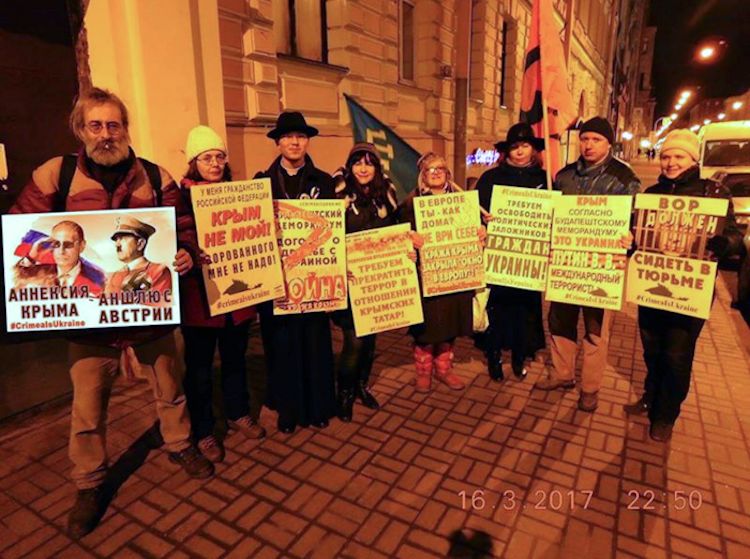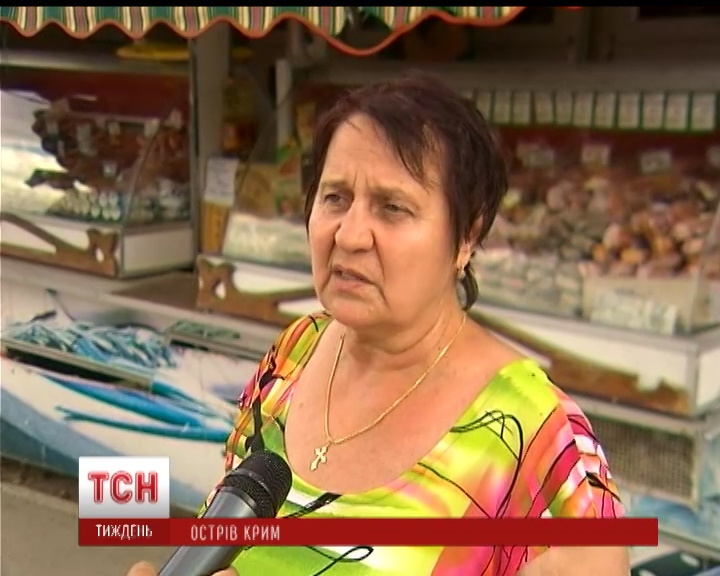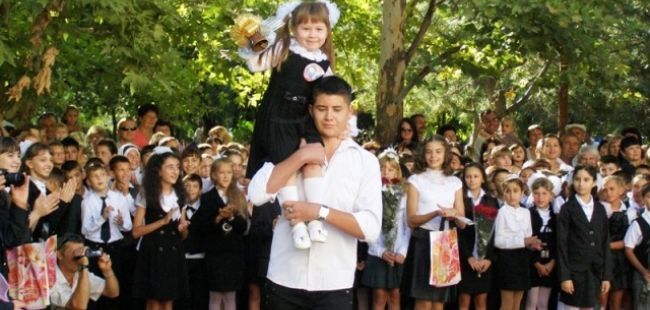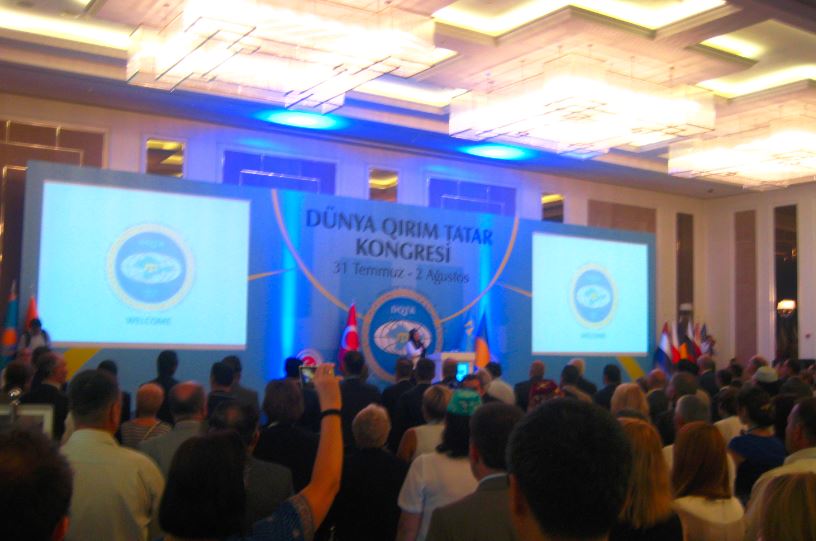The active phase of Russian aggression against Ukraine started not in 2022 but in 2014, with the occupation of Crimea, followed by the invasion of the Donetsk and Luhansk oblasts. Over the past eight years, Russia has turned Crimea into a military base. It is not only Ukraine that has noted this fact – the UN General Assembly adopted resolutions on the militarization of the Autonomous Republic of Crimea and the city of Sevastopol several years ago. From the very first day of this new stage of the war, Crimea has been used by Russia as a key springboard for its attack.
Crimea resists
Several small local protests against the war in Ukraine have taken place in Crimea amid the repressive occupation regime. The ability to obtain information from within the peninsula is very limited, especially now; however, from open sources, we know that protests took place in at least Simferopol, Yalta, and Feodosia. According to the Mission’s information, people also protested in Yevpatoria. Participants of those protests were fined or arrested.
After the launching of the full-fledged military campaign in the territory of Ukraine, Russia adopted new legislation establishing criminal liability for those who seek to discredit the use of the armed forces of Russia. These new laws were used immediately in Crimea.
As RFE/RL reports, after just three days Crimean occupying police announced that four cases of such “discreditation” had been identified, and those accused were fined by the occupying courts. One of the decisions was issued by the infamous judge Viktor Mozhelyanskyi, who was put under sanctions in 2021 by the EU for participating in numerous politically motivated cases.
Another person was arrested for painting over the monument of a Russian serviceman who participated in the occupation of Crimea in 2014.
These new laws are accompanied by heavy propaganda in support of Vladimir Putin and the so-called anti-Nazi “military operation” as well as threats to Crimean residents related to spreading any information that differs from official Moscow propaganda. For instance, Mission sources in the peninsula report that parents of schoolchildren are threatened via messengers that their children could end up with real prison terms should they decide to protest or “discredit” the Russian armed forces.
Political persecutions in Crimea are ongoing
On 16 March 2022, Crimean Tatar human rights activist Abdureshyt Dzhepparov was arrested after the search conducted in his house by the occupying law enforcement agencies. A few days ago, Mr. Dzhepparov told in an interview with the Ukrainian media outlet LB.ua about the devastating casualties of the Russian army that are obvious for Crimea residents (full morgues and overcrowded hospitals).
Also, he said that Crimean Tatars will welcome the de-occupation of the peninsula. In the very beginning of the occupation of Crimea, in September 2014, the son and nephew of Mr. Dzhepparov were kidnapped and are still missing.
Also on 16 March 2022, Crimean Tatar activists Fevzi Yakubov and Muhammed-Ali Dzhepparov
were arrested as they came to support Mr. Dzhepparov during the search.
Courts in Crimea and in Russia continue to pursue politically motivated cases, with most members of the Crimean Tatar community being targeted. On March 10 the sentence in one case against a Crimean Tatar was announced: 19 years of imprisonment. Within the group case, journalist Remzi Bekirov was sentenced. The organizations Reporters Without Borders and the Committee to Protect Journalists issued statements criticizing the decision of the court and demanding that the journalist be released immediately.
The case of Nariman Dzhelyal as well as many other cases continues to be considered by the courts, mostly on the territory of the Russian Federation where those arrested are transferred from the territory of Crimea in violation of international law. Ukrainian consulates suspended their operation in the Russian Federation. Therefore, we encourage foreign embassies to attend court hearings in politically motivated cases. The schedules can be found here.
Russia conceals deaths of Crimeans fighting on its side
The number of Crimean residents killed as a result of participating in the occupying army is growing. While Russia continues to hide the real figures, instances appear on social media.
The occupying administration of the Russian Federation in Crimea acknowledged the fact that some Crimean residents have been killed; however, it continues to hide the real number of dead soldiers sent to the war from Crimea.
In the meantime, the number of Crimean residents killed and captured as participants of the occupying forces is growing.
Analyses of information from open sources indicate reports of a series of funerals all over Crimea: on March 14 in Kerch, on March 12 in Sevastopol and Alushta, on March 10 in Sevastopol (two persons), on March 9 in Sevastopol, on March 7 and March 5. These are residents of the peninsula of Crimea, Ukrainian citizens who illegally obtained Russian citizenship after the beginning of the occupation.
Wounded Russian soldiers are sent to Crimea
In a previous briefing, we reported that hospitals in Crimea, especially in its northern part, are packed with wounded Russian soldiers. We are receiving more and more confirmation of this. Sources in the peninsula in Simferopol have noted the characteristic odour of dead bodies, presumably coming from train cars that are stationed at the railway station.
It is not only Crimean residents participating in the Russian armed forces who are being treated in Crimea. Russia actively uses residents of various parts of the Russian Federation of non-Slavonic origin as cannon fodder.
Recently we have received via our sources a list of 44 Russian soldiers mostly of Dagestan origin from the 150th division located in Novocherkassk (Rostov Oblast) who presumably were sent to the hospital in Crimea after defeat by the Ukrainian army. The Mission is trying to cross-check this information in the field.
Oppression of activists in region near Crimea
Oppression of local government representatives and activists in the occupied areas of the Kherson Oblast neighbouring Crimea is now taking place, while the region continues to resist the occupation.
The Mission is following the situation in the Kherson Oblast closely as this territory is a gate from mainland Ukraine to Crimea. One of the two offices of the Mission is located in Kherson. This region is known for hosting many IDPs from Crimea after the beginning of the occupation in 2014.
Developments in the Kherson Oblast in recent weeks have been quite dramatic. The region has become the scene of armed clashes between the occupying army and Ukrainian forces. Some areas of the region have been occupied. In the meantime, there have been active peaceful protests against the occupation even in the partly occupied towns and villages, for instance, in Genichesk, Kahovka, Bilozerka, and Kherson.
Ukrainians of occupied towns protest against Russian invaders, undermining “liberator” narrative
One of the first steps is violence against those who actively oppose the occupation. Namely, representatives of the local government who maintain a firm position on the territorial integrity of Ukraine, security service officers (including those former and retired), journalists, and activists are being kidnapped. Some of them are likely to be tortured and even killed. For instance, on March 12 in Nova Kahovka,
activist Sergiy Tsigipa
disappeared, and on the same day in neighbouring Kahovka journalist Oleg Baturyn disappeared as well.
There are multiple testimonies of occupying forces attempting to pressure local elected officials into accepting the occupation scenario. Occupants have established their checkpoints where telephones and cars of residents are checked.
"If something suspicious is found on a phone, people are detained immediately," reported one Kherson resident to the Mission. In addition, occupying forces are coming to the homes or workplaces of “particularly dangerous” persons. The command may even send troops to settlements that are not under the control of Russian troops in order to kidnap a particular person.
Crimea runs out of basic goods
As the economic situation worsens in Crimea, there is a shortage of some basic products. According to information of the Mission, there is a shortage of certain staples such as sugar. In some towns in Crimea, sales of these basic products has been limited. Sometimes residents cannot buy sugar at all.
For instance, in Feodosia the purchase of sugar was first limited to 2 kilos per person, and after a few days it disappeared completely. The cost of groceries is growing rapidly. Some shops post announcements that prices are not fixed and may change within the day, so it is suggested that clients ask for the actual prices.
Key concerns of Crimeans
The main request from Crimean residents concerns documentation with Ukrainian IDs and avoiding mobilization by the Russian army. The Mission continues to receive appeals from residents of Crimea.
Among the key requests are issues related to crossing the border to third states due to the problem of documentation (currently, the Mission jointly with the MFA are working on solving this problem) and how to avoid conscription and mobilization by the Russian armed forces. Foreign fighters are addressing the Mission on how to join the international battalion of the Ukrainian armed forces.
Crimean Tatar activist makes a statement against the war
Server Mustafayev, Crimean Tatar activist and human rights defender has made a statement against the war and in support of the courage of Ukrainian citizens.
“The price is way too high, but that is the price we have to pay in order to open the eyes of the whole world and make it acknowledge the fact that since 2014 there have been multiple alarming signals. However, the world reacted lazily to them… I admire the courage of the Ukrainian people. I sincerely believe that all these developments will inevitably end with the victory of truth and that justice will overcome the injustice, deception and propaganda that has lasted for all these years. I am sure that there will be no space for indifference now. That is something we have insisted upon for the last eight years. Don't wait for trouble to come to your home. Each of us must identify and anticipate those troubles that may be on the doorstep of everyone's home tomorrow.” (March 10, 2022)
Server Mustafayev, a human rights defender and journalist, has been in detention since May 2018, on false terrorism-related charges. On 12 September 2020, he was transferred from Crimea to southwest Russia and sentenced by a Russian military court on 16 September 2020, to 14 years in a strict regime penal colony. On 21 August 2020, in accordance with the Decree of President of Ukraine Volodymyr Zelenskyy, Server Mustafayev was awarded the 3rd Grade Order of Merit. Currently, he is kept in detention in one of the Russian colonies.
Portal to collect Russian human rights abuses
Ukrainian governmental agencies launched a joint portal for collecting facts on human rights abuses due to Russian aggression.
A joint initiative of the Office of the President of Ukraine, the Ministry of Justice of Ukraine, the Ministry of Foreign Affairs of Ukraine and the Mission of the President of Ukraine in the Autonomous Republic of Crimea has been launched to collect facts on human rights abuses. The web platform is aimed at collecting and processing information on human rights violations resulting from Russian aggression in Ukraine. The collected information will be used by Ukraine as evidence at the European Court of Human Rights and the UN International Court of Justice.
The Mission is also cooperating with Ukraine 5 AM Coalition, devoted to documenting war crimes in Ukraine for the purpose of protecting the victims of Russian armed aggression and bringing to justice the top leadership of the RF, as well as the direct perpetrators of war crimes and crimes against humanity. The coalition consists of 16 Ukrainian human rights organizations.
War crimes in Crimea
War crimes and crimes against humanity are taking place not only in mainland Ukraine but also in occupied Crimea. Among these crimes are:
- Conscription and mobilization of residents of Crimea to the ranks of the Russian armed forces and other military formations, in particular for the purpose of participating in hostilities in mainland Ukraine;
- Propaganda of war and violence against Ukraine, in particular with the use of the educational system in Crimea;
- Persecution of Ukrainian citizens, including activists, Crimean Tatars and Ukrainians, journalists in Crimea in the context of the armed aggression of the Russian Federation against Ukraine.
The first brief drafted by the Mission of the President of Ukraine in Crimea is available here.
Related:
- Russia rapidly moving landing ships, submarines of Baltic, Northern & Pacific fleets to Black Sea
- Russia continues to plunder and destroy Crimea’s cultural heritage: 150 crimes documented by experts
- New strengthened UN Crimean resolution calls on states to join Crimea Platform, names Crimean Tatars an indigenous people
- Russia continues to coerce Crimeans into its military and punishes those that resist
- “After the third shock, my brain exploded”: Crimean Tatar activist says FSB tortured him with electricity to obtain “confessions”
- How Crimean Tatar leader Dzhelyal swelled the ranks of Ukrainian “saboteurs”
- With Crimea Platform, sanctions can become even smarter — UK Ambassador’s interview, part 1
- Crimea Platform – mere formality or workable mechanism to recover Ukraine’s peninsula?





